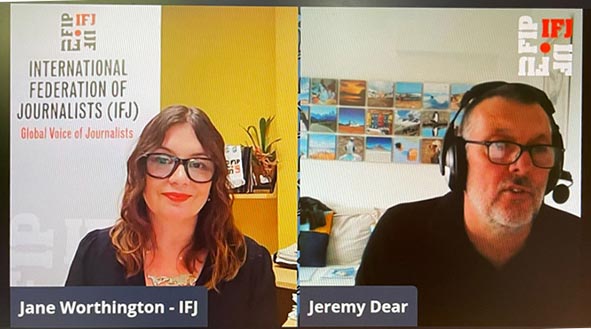Staff Reporter
ITANAGAR, 1 Nov: The International Federation of Journalists (IFJ) kick-started its three-day Asia-Pacific regional online meeting, themed ‘Future power 2021: Organizing media in challenging times’, on Monday.
The event is being organized in partnership with Friedrich-Ebert-Stiftung (FES), a non-profit German foundation committed to the values of democracy and social justice.
Hosting the opening session, IFJ Asia-Pacific Director Jane Worthington said, “Over the next three days, the IFJ and its network from across Asia-Pacific and beyond will meet here in this space – online – to share experiences, learn from each other, strategize, organize and build solidarity and collective power.”
The IFJ director added that the IFJ is seeking to address two key union issues in the meeting: helping unions and activists in protecting jobs and working conditions in the wake of the economic fallout wrought by the Covid-19 pandemic, “and helping them in adapting to and confronting the ongoing digitalization that is continuing to disrupt and transform our media industry globally.”
“In the past couple of years, the global pandemic has really shown the vital role that journalists play in informing societies at critical times. It has also demonstrated the precarious state in which many journalists and independent media live,” she added.
Worthington further informed that IFJ research has highlighted issues such as journalists being forced to work on the frontline without any protective equipment, journalists who have tested positive for Covid-19 hiding the fact and continuing to work for fear of being sacked, and journalists being made redundant with no compensation, seeing wages cut and having working hours reduced.
She added that IFJ research also highlighted journalists not being paid for months, and some being forced into homelessness and destitution.
“Labour rights abuses have soared,” she said, and informed that “the journalists’ representative bodies are voicing the needs of journalists, pushing governments for necessary reforms or support and highlighting the importance of media and press freedom as a cornerstone of democracy.”
According to Worthington, the IFJ’s global surveys in recent years have shown that the number of workers in the digital media industry has more than doubled in recent years. “It is the fastest growing media sector in 92 percent of the countries. It is now a bigger global employer than radio and its current growth rate is set to surpass TV. The average percentage of union membership that is freelance has risen from 22 percent to 31 percent in the last decade alone,” she said.
IFJ Deputy Secretary-General Jeremy Dear in his address highlighted the steps being taken by journalists’ unions across the globe to adapt to trying times amid global pandemics. “The challenges we had before are exacerbated. It is a kind of turbo-charge trend we have seen in the industries over the last few years, including increasingly precarious works and so many people without contracts or job security,” he said.
“Many more people are being forced to work as freelancers and many more people have more than one job. As a result of that, it poses challenges for the traditional media, newspapers, and national broadcasting,” he said.
“How do we stand up for ethical journalism in the workplace? We need a collective voice to do that. An individual finds it hard to stand up and say no to a manager who is trying to get them to misinform or issue mis-fact stories. Collective voice is louder,” Dear said.
International Trade Union Confederation General Secretary Sharan Burrow spoke on trade union movements and advocated strategies to fight against attack on free media.
Jonathan Menge, the head of the Nepal chapter of FES, expressed hope that unions and organizations would benefit from the online meeting.
“FES as an organization is committed to the core values of social democracy, freedom, justice and solidarity,” he said.
Indian Journalists Union President Geetharta Pathak, Secretary-General Sabina Inderjit and National Secretary Amar Sangno are among the speakers in the three-day regional online meeting.




